
Lepidoptera is an order of insects that includes butterflies and moths. About 180,000 species of the Lepidoptera are described, in 126 families and 46 superfamilies, 10 percent of the total described species of living organisms. It is one of the most widespread and widely recognizable insect orders in the world. The Lepidoptera show many variations of the basic body structure that have evolved to gain advantages in lifestyle and distribution. Recent estimates suggest the order may have more species than earlier thought, and is among the four most speciose orders, along with the Hymenoptera, Diptera, and Coleoptera.

Lymantria dispar, sometimes known as the gypsy moth, is a species of moth in the Erebidae family. Lymantria dispar is subdivided into several subspecies, with subspecies such as L. d. dispar and L. d. japonica being clearly identifiable without ambiguity. Lymantria dispar has been introduced to several continents and is now found in Europe, Africa, Asia, North America and South America. The polyphagous larvae live on a variety of deciduous and coniferous trees and can cause severe damage in years of mass reproduction. Due to these features, Lymantria dispar is listed among the world's 100 most invasive alien species.

Yellowjacket or yellow jacket is the common name in North America for predatory social wasps of the genera Vespula and Dolichovespula. Members of these genera are known simply as "wasps" in other English-speaking countries. Most of these are black and yellow like the eastern yellowjacket Vespula maculifrons and the aerial yellowjacket Dolichovespula arenaria; some are black and white like the bald-faced hornet, Dolichovespula maculata. Others may have the abdomen background color red instead of black. They can be identified by their distinctive markings, their occurrence only in colonies, and a characteristic, rapid, side-to-side flight pattern prior to landing. All females are capable of stinging. Yellowjackets are important predators of pest insects.

Dolichovespula maculata is a species of wasp in the genus Dolichovespula and a member of the eusocial, cosmopolitan family Vespidae. It is known by many colloquial names, primarily bald-faced hornet, but also including bald-faced aerial yellowjacket, bald-faced wasp, bald hornet, white-faced hornet, blackjacket, white-tailed hornet, spruce wasp, and bull wasp. Technically a species of yellowjacket wasp, it is not one of the true hornets, which are in the genus Vespa. Colonies contain 400 to 700 workers, the largest recorded colony size in its genus, Dolichovespula. It builds a characteristic large hanging paper nest up to 58 cm (23 in) in length. Workers aggressively defend their nest by repeatedly stinging invaders.

The Tortricidae are a family of moths, commonly known as tortrix moths or leafroller moths, in the order Lepidoptera. This large family has over 11,000 species described, and is the sole member of the superfamily Tortricoidea, although the genus Heliocosma is sometimes placed within this superfamily. Many of these are economically important pests. Olethreutidae is a junior synonym. The typical resting posture is with the wings folded back, producing a rather rounded profile.
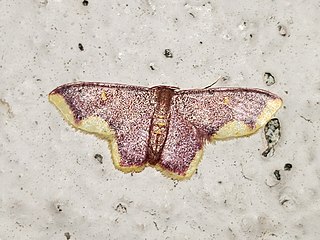
Lophosis is a monotypic geometrid moth genus. Its only species, Lophosis labeculata, the stained lophosis, is found in North America. Both the genus and species were first described by George Duryea Hulst, the genus in 1896 and the species in 1887.

Lophocampa maculata, the spotted tussock moth, mottled tiger or spotted halisidota, is a moth of the family Erebidae and the tribe Arctiini, the tiger moths. The species was first described by Thaddeus William Harris in 1841. It is found across Canada, the western parts of the United States, south in the Appalachians to South Carolina and Kentucky.

Thyris fenestrella, commonly known as the pygmy, is a moth of the family Thyrididae.
The following are the regional Lepidoptera lists by continent. Lepidoptera is the insect order consisting of both the butterflies and moths.
A. maculata may refer to:
S. maculata may refer to:
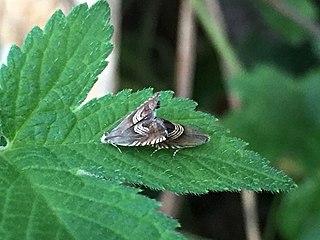
Grapholita delineana, known generally as Eurasian hemp moth, is a species of tortricid moth in the family Tortricidae. Other common names include the hemp moth and hemp borer.

Eucosma glomerana is a species of tortricid moth in the family Tortricidae.
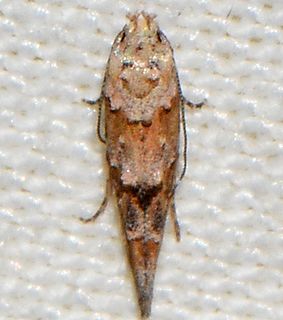
Mompha stellella is a species of momphid moth in the family Momphidae.
Eucosma essexana, the Essex phaneta moth, is a species of tortricid moth in the family Tortricidae.
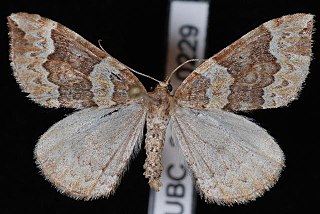
Eulithis destinata is a species of geometrid moth in the family Geometridae. It is found in North America.
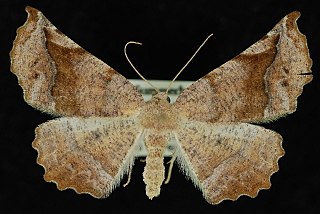
Caripeta hilumaria is a species of geometrid moth in the family Geometridae.
Leucania multilinea, the many-lined wainscot, is a species of cutworm or dart moth in the family Noctuidae. It is found in North America.

Nemoria elfa, the cypress emerald moth, is a species of emerald in the family Geometridae. It is found in North America.
Zenophleps obscurata is a species of geometrid moth in the family Geometridae. It is endemic to North America.
















